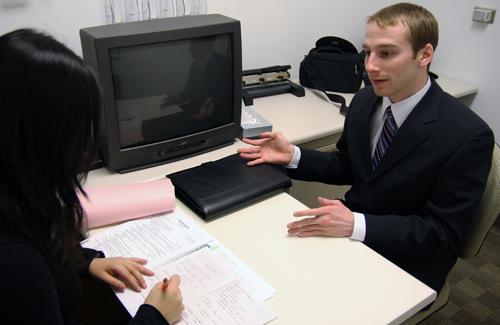Research is key to interviewing

Sujie Zhou (left), a graduate student, interviews Andrew Wood (right), a senior in LAS, during a mock interview at the Career Center on Wright Street on Friday afternoon. Wood found the experience very helpful and said, “The more times you do it the more Pamela Nisivaco
February 2, 2009
An interview can bring a resume to life and put a face on a potential employee, according to staff at the University’s Career Center. No pressure. But if you plan accordingly, an interview shouldn’t stress any student to the point of anxiety.
An interview can bring a resume to life and put a face on a potential employee, according to staff at the University’s Career Center.
No pressure.
But if you plan accordingly, an interview shouldn’t stress any student to the point of anxiety.
“First thing’s first, it’s OK for students to ask the receptionist what attire is expected of them. But when in doubt overdress and over prepare,” said Damian Lay, assistant director at the Career Center.
Get The Daily Illini in your inbox!
Students should have note cards, a folder, extra resumes and a portfolio displaying previous work, Lay suggested. However, there is one piece of advice he always stresses to those who are on the prowl for their next opportunity.
“Always, always research the company, organization or grad school you are applying to and ask a lot of questions,” Lay stressed. “If the interviewee isn’t well informed about the company or only asks questions about the salary rates, the employer could connect that lack of preparation and lack of interest to the future job performance of that person.”
He acknowledges the beginning of the interview can be the most intimidating portion for many students.
“It’s OK to start off an interview with a little small talk, weather and such,” Lay said. “It shows the interviewers that you’re human and that you’re confident and at ease.”
As the process continues, the interviewee should keep the interviewer focused solely on their answers. That means eliminating any nervous habits, such as fidgeting, stuttering or looking towards the ground. The interviewer could portray that as a lack of confidence, Lay said.
“Mock interviews help a lot with that sort of stuff,” said Elysia Munoz, senior in AHS. “They sit you down and create the setting of a real interview, video tape it and let you take it with you. It’s cool, because you notice little nervous things you might do a lot but never notice.”
Even with preparation, it’s easy to let anxiety get the best of you in the moment, said Lay.
“If you’re nervous it’s OK to stop, take a deep breath and take a minute to think how you want to approach your question,” Lay reassured. “When in doubt, a brief answer is better than rambling on.”
The Career Center has planned mock interviews from Feb. 2-5 and offers archives to students who want to research companies’ histories, salaries and more.






